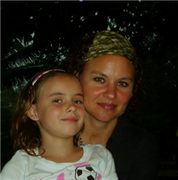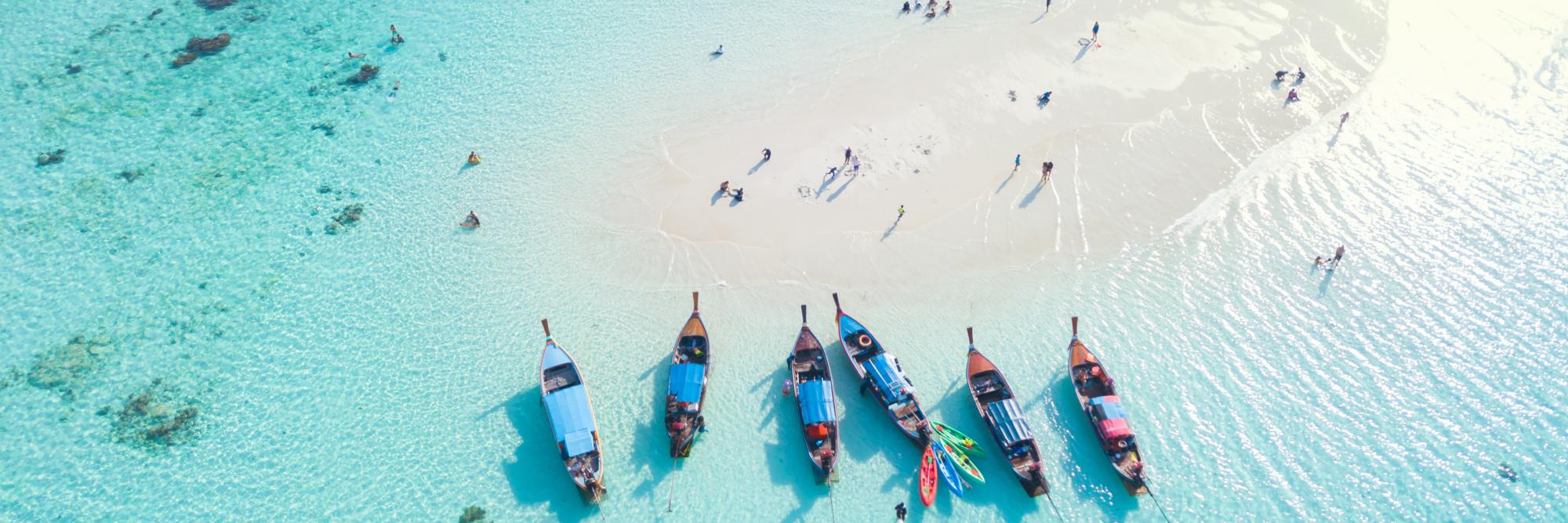 Rosanne Turner is an adventurer, traveller, writer, mom and TEFL teacher living in Koh Samui, Thailand.
Rosanne Turner is an adventurer, traveller, writer, mom and TEFL teacher living in Koh Samui, Thailand.
"I'm savouring the adventure! Prior to this, I lived in Hermanus, on the Cape Whale Coast of South Africa, famous for its land-based whale watching, where I was involved in the tourism industry. A few years ago, I rekindled a childhood passion for writing, and combined this passion with my love of travelling, to create travel articles for websites and tourism publications. I now have a regular column, 'Discovering Samui', in the Samui Gazette."
She has not let her atrocious sense of direction deter her from travelling the world. "My journeys have taken me through Africa and the Indian Ocean Islands, (including Madagascar, Zanzibar, Tanzania and the Transkei) and to the Far East (including China, Hong Kong, Singapore and Thailand). I prefer to see the lighter side of life when travelling, viewing things from a different angle. This is depicted in my articles which often have a tongue-in-cheek approach."
Rosanne is now the Course Director of Samui TEFL (Teaching English as a Foreign Language).
Read more about expat life in Thailand in our Expat Arrivals country guide to Thailand or read more expat experiences in Thailand.
About Rosanne
Q: Where are you originally from?
A: Hermanus, which is about 1 hour from Cape Town, South Africa
Q: Where are you living now?
A: The island of Koh Samui, Thailand. The area I live in is called Bang Rak, near the Big Buddha
Q: How long you have you lived in Thailand?
A: One year
Q: Did you move with a spouse/ children?
A: Yes, the whole brood! Husband, 8-year-old daughter as well as my mother. My mother-in-law stays with us for a few months at a time.
Q: Why did you move; what do you do?
A: We used to come to Samui on holiday often. Both my husband and I enjoy travelling, and although we lived in one of the most beautiful places in the world, we needed a change, and didn’t like the thought of living in one place forever. We thought that if we were to make a change, then it may as well be a drastic one, and change continents, so we set the ball in motion, which took about 2 years to do. We had many loose ends to tie up in South Africa, as we owned our own businesses.
About Koh Samui
Q: What do you enjoy most about Koh Samui, how’s the quality of life?
A: The quality of life on Samui is excellent. The Thai people are wonderful, friendly, laid-back and it’s hard not to take on their easy-going way of life when you are here. The beaches must be our favourite aspect, as well as the food.
Q: Any negatives? What do you miss most about home?
A: We lived in the middle of the best pinotage and chardonnay region in South Africa, and good wine was a way of life for us. To me, other than friends and family, wine is what I miss most! Sure, you can buy good wine on the island, but not at the prices we are used to paying in South Africa. So if that is the worst thing about being here, then not a bad place to be.
Q: Is Thailand safe for expats?
A: Thailand is extremely safe. I have never felt safer in all my travels. The Thais are Buddhists, and are not a violent nation at all. Random crime seldom exists. When you hear of shootings etc, it usually involves a love triangle, or a ‘business deal’ gone bad.
Q: Describe an ideal way to spend a weekend in the city?
A: We usually start our Friday night at the Fisherman’s Village ‘walking street market’. Each Friday night, the area is closed off to traffic, and comes to life with food stands, cocktails, musicians and locals and ‘farangs’ (westerners) gather for a good time. The rest of the weekend will usually involve the beach or water in some way. (My husband is a sailor). Choeng Mon beach is near to us, and is our favourite beach as it is family friendly, with clear water, and good local eateries.
Q: Which are the best places/suburbs to live as an expat?
A: This varies a lot, depending on whether you have a child that goes to school or not. Older expats don’t mind the quieter south of the island, but for anyone working or having to do the school run, this is just too far from anything. The north and north-eastern areas of Maenam, Bophut, Bang Rak and Choeng Mon have a larger expat community. Different nationalities also seem to congregate in areas, with many French in the Fisherman’s village (Bophut) area, and Germans in the eastern area of Lamai.
Q: What’s the cost of living in Thailand compared to home? What is cheap or expensive in particular?
A: Food is cheap, if you eat like a local and buy veggies and fruit at the fresh markets. Western foods such as cheese, ham, etc is expensive. Other than that, water and electricity is pretty cheap if you buy direct from the government. Sometimes, the cost can go up living in a complex, as the developer adds on a surcharge. Our monthly expenses are pretty much the same here as in South Africa, but we bought a car cash instead of paying one off, and currently rent a house, instead of paying off a mortgage. We do plan on building a house in a few years time.
Q: What are the locals like; do you mix mainly with other expats?
A: We do mainly mix with other expats, or couples that are mixed – half Thai, half expat. The reason for this is none other than the language barrier. We are currently learning Thai, so hopefully this will widen our social circle once we master the language.
Q: Was it easy meeting people and making friends in Thailand?
A: Yes. It is always easier making friends when you have a child, as a school is a great way to meet people. Other than this, being active and ‘getting out there’ will mean that you will meet people easily. What I love about our circle of friends, is that they are from all over the world. Expats tend to be like-minded in that you have to have a certain mentality or school of thought to give up what you know and move to another country. This forms an automatic bond as well. Most expats out here, set up their own businesses, with the exception of English teachers, and resort or managers.
About working in Thailand
Q: Did you have a problem getting a work visa/permit?
A: We started out on tourist visas. We then got education visas, as we are studying Thai. Now that we have our own businesses, my husband and I are on B1 visas (business visas) and have work permits. My mother is still on an education visa. Children don’t get charged for overstay, which means that they can come in on their original visa, and stay on when it expires, with no cost involved. This spares them the tiring ‘visa run’ experience – if you have someone to leave them with while you do the gruelling trip to a consulate outside the country – in our case, Penang, Malaysia. My husband and I arrived here 2 months apart, so we seldom do visa runs together, which means that our daughter has always had someone to stay with. Now that we are on B1 visas, we have a year at a time.
Q: What’s the economic climate like in Thailand, is there plenty of work?
A: It is not easy to get a general job in Thailand, as it is hard to get a work permit for a job that a Thai could do. The exception here is teaching English. (TEFL – teach English as a foreign language) If this is not a field you want to go in to, then most expats tend to open their own businesses, and you can then get a B1 visa, and a work permit, with a load of paperwork!
Q: How does the work culture differ from home?
A: I don’t deal with many Thai people in my line of work. I run a TEFL school, meaning that I train Western people to teach English in Thailand. We do teacher practices at businesses and schools in the area. Here I experience many frustrations, as lessons often get cancelled, or times and dates are lost in translation. Thai people have a very relaxed attitude to work and life in general, unlike the task and results driven people of other Asian countries such as Japan, China and Korea. This can be very frustrating at times, as everything seems to take forever to do, be it getting your car serviced, to ordering something from Bangkok. Learn the phrase ‘Mai pen rai’ and you will be fine – learn to live by the phrase too which basically translates to ‘no worries’ or ‘never mind’.
Family and children
Q: Did your spouse or partner have problems adjusting to their new home?
A: My husband only moved here 3 months after me, as he still had business to tie up in South Africa. We decided that he would take 6 months off before he started working, as he wanted to be certain of what he wanted to do, and not jump into the first opportunity that presented itself. Within a few weeks he was bored of playing house husband while I was at work, as he is used to working and being active. It was a necessary decision though to not jump into the wrong thing, and it was worth waiting as now he has found the right prospect for him, which involves water sports and sailing – his passion.
Q: Did your children settle in easily?
A: My daughter did settle in well. In the beginning, she was a bit torn, as her father was not with us. As soon as he joined us, she adjusted well. The only thing she finds hard, besides missing her friends, is leaving her pony behind in South Africa. There is only one rather sad looking bush pony on the island, and in South Africa, horse riding was how she would spend her free time.
Q: What are the schools like, any particular suggestions?
A: There are some excellent schools on the island, and in particular, the school that my daughter attends. This is the International School of Samui. It follows the British curriculum, and the teachers and facilities are excellent.
Q: How would you rate the healthcare in Thailand?
A: There are 4 hospitals on the island. I have not had to use one yet, so I cannot really comment. There is a pharmacy on every corner, and most are open until late at night. Medicine is really cheap here, as are optometrists and dentists.
And finally…
Q: Is there any other advice you like to offer new expat arrivals?
A: Be adventurous! Try new food, do things you would never have done at home. Skip the tourist traps, explore and discover! This is one of the safest countries to be lost in, so don’t be afraid of getting lost in your quest to explore. When you live on an island, you can never be lost for long, as all roads eventually lead back to where you started.
– Interviewed August 2011



